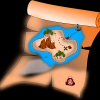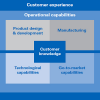Business Transformation Requires Transformational Leaders
Leadership and teaming skills are front and center in times of rapid change. Meet today’s constant disruption head on with expert guidance in leadership, business strategy, transformation, and innovation. Whether the disruption du jour is a digitally-driven upending of traditional business models, the pandemic-driven end to business as usual, or the change-driven challenge of staffing that meets your transformation plans—you’ll be prepared with cutting edge techniques and expert knowledge that enable strategic leadership.
Recently Published
While strategy, risk, and metrics coexist tangentially in many organizations, the nexus of the three reflects the degree to which management thinks and acts proactively.
Businesses have traditionally organized themselves to ensure optimal effectiveness in each of their business functions. In today’s business climate, however, shorter product lifecycles, demand for customization, rising consumer expectations, and the growth of automation and data challenge this model. This Advisor describes the building blocks of generic capabilities and describes three categories of capability-based players seeking competitive advantage.
The chief scientific officer — or CSO — plays a key role in research and technology organizations (RTOs), ensuring scientific leadership, setting medium- to long-term strategy, and influencing scientific investment, among other roles. In a recent study, Arthur D. Little (ADL) set out to understand the full scope of the CSO position in RTOs across the globe.
If you believe the undisputed research about diversity, equity, and inclusion improving outcomes, then ensure your behaviors match. If you value the importance of living in alignment with your values, then show the proof.
This issue of The Cutter Edge explore strategies for making diversity, equity, and inclusion a strategic priority in your organization, why software development and change should be managed as a process, and more.
Executive Update
Information Superiority from Operational Excellence
Of the three value disciplines, operational excellence is the one where real-time data streaming is most critical. While product development should operate at a reasonably fast and agile tempo, and customer engagement assumes a reasonably up-to-date picture of the customer, some of the most interesting benefits of real-time data collection and analytics sit in operations.
Despite a lack of solid evidence, most stakeholders agree that the health economics of mHealth look compelling. If, however, mHealth implementation expands post-pandemic as an integral part of established healthcare over the long term, the question then becomes who should pay for mHealth. The answer relies primarily on two parameters: who benefits economically from mHealth and who bears the risks of healthcare costs.
How well is your company dealing with the pandemic? As the pandemic crisis deepened and all your business plans were invalidated rapidly, you probably tried to experiment and innovate at high speed. Experimenting can easily be done as an undirected action if there is no reflection happening. Only reflection allows us to come up with experiments that are based on an hypothesis (drawn from both experience and theory). Then we can innovate — by understanding how to measure the experiments in order to (in-)validate our hypothesis.























